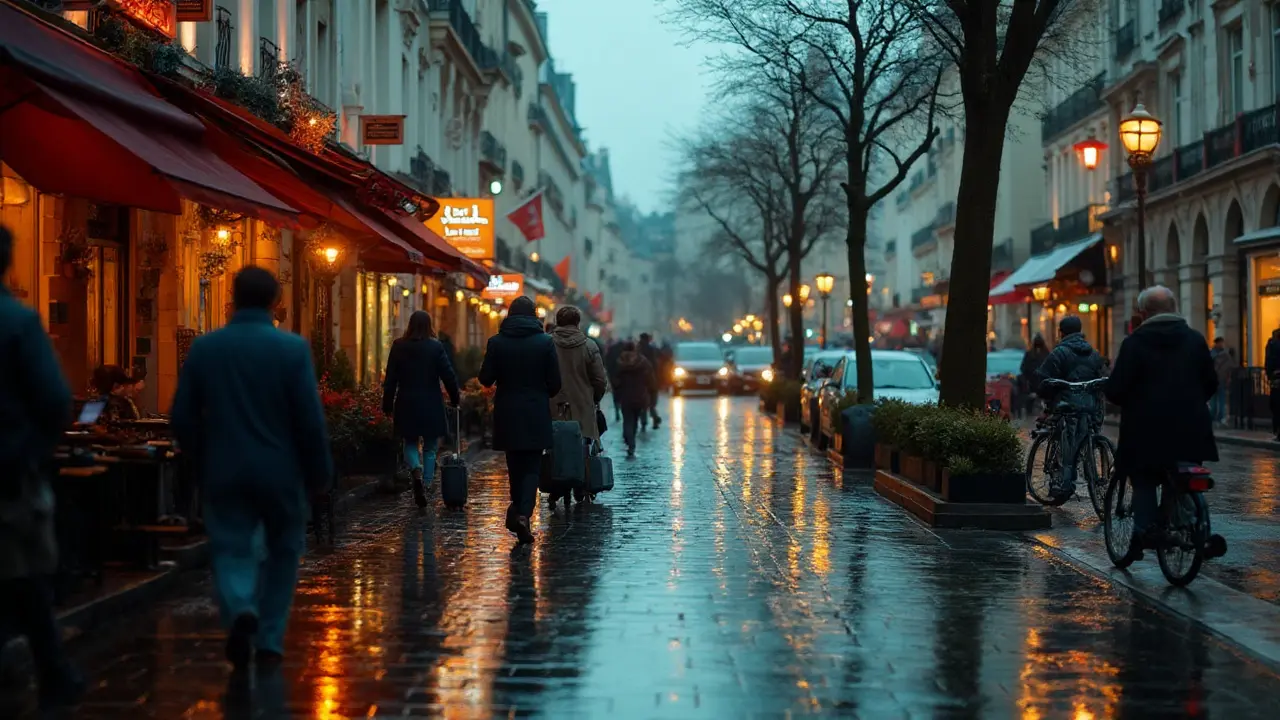TL;DR
- Paris attracts foreign-born escorts because of high-spending visitors, digital platforms, and agency hubs.
- France uses the "Nordic model": selling sex isn’t criminalized; paying for it is fined (Loi n° 2016-444). Agencies and ads sit in legal gray areas.
- Most work is now online-first; verification, photos, and multi-language listings drive visibility.
- Risks: client-side fines, scams, coercion, platform takedowns, and immigration issues. Harm-reduction and consent-first etiquette matter.
- Compared with London or Berlin, Paris has stricter client penalties and more street displacement to online channels.
You clicked because you want a clear picture of what’s behind the rise of international escorts in Paris-what changed, what’s legal, where the market moved, and how it compares to other cities. Here’s the straight story: no glamor, no panic. Just how it works in 2025, the risks on all sides, and the signals that actually matter.
What’s Driving the Rise: Migration, Money, and Algorithms
I’ve watched the city recalibrate around a simple equation: global demand meets easy digital reach. Paris draws high-spending visitors-business travelers around La Défense, fashion and art crowds, luxury tourism around the Golden Triangle-and that keeps rates stable. But the big shift isn’t the tourists; it’s the plumbing of the internet. Search, social, encrypted chat, and agency booking stacks stitched the market together and made it visible. That visibility reads as a “rise.”
Start with migration. Over the last decade, France’s foreign-born population grew steadily (OECD Migration Outlook; INSEE population stats). A slice of that workforce ends up in the city’s informal economy-sex work included-because it’s a fast-moving cash market with low barriers to entry and high language elasticity (you can work with basic English plus translation apps). NGOs like Médecins du Monde and Amicale du Nid have long reported a strong foreign-born presence among sex workers, especially in bigger metros.
Next, pricing power. Paris lives in the same bracket as London, Dubai stopovers, and certain Swiss cities for business travel. That means a relatively stable top end for private companionship. When prices hold, agencies recruit beyond borders. Recruiters lean on multi-language websites, paid search in English and Spanish, and curated photo sets to pull bookings. Even independent workers ride the same currents by listing in multiple languages and time-shifting posts to hit US and Gulf time zones.
Then there’s platformization. In 2015 you still had forums and a mess of classifieds. By 2025 you have fewer, bigger directories; invite-only verification circles; agency-managed calendars; and content moderation that’s inconsistent but predictable. The EU’s Digital Services Act forced platforms to tighten moderation and reporting. That didn’t shrink the market; it redistributed it to sites that could prove age and consent, support takedowns, and keep payment rails alive. When a platform can onboard a Bulgarian, Brazilian, or Spanish worker and translate their profile automatically, Paris listings feel suddenly “more international.”
Two myths need a reality check. First, big events don’t automatically spike prostitution. Authorities and NGOs in Europe have challenged that narrative for years. You might see a short-term blip in ads or travel, but not the tidal wave headlines promise. Second, the “street scene” is only a small slice of the whole. Most action moved online years ago; that’s where agencies and independents consolidate.
What does the day-to-day look like? Agencies prefer apartments near good transport, discreet buildings, concierge-friendly entries, and fast housekeeping turnover. Independent workers split between short lets and mid-term sublets with roommates who understand the deal. Calendars are booked across platforms: noon slots for business lunches, early evenings for visitors around Opera and Champs-Élysées, and late-night for night owls in the 2nd and 9th. Language-wise, English is the default for foreign clients; Spanish, Portuguese, and Russian appear frequently in listings; French helps with landlords and neighbors.
Signals you’re seeing a real uptick, not just louder marketing:
- More multi-language profiles with localized Paris references (arrondissement names, metro lines, landmarks) rather than generic “City of Light” fluff.
- Agency rota patterns: the same profiles appearing in Paris, then Brussels or Geneva the following week, pointing to cross-border circuits.
- Verification badges tied to ID or video checks, plus independent references from known reviewers or photographers.
- Rates pegged to Paris hotel pricing cycles-higher during fashion weeks and major fairs-suggesting real demand rather than spam.
Below are anchor facts to keep your bearings. Where ranges are broad, it’s because the data is fragmented and the market is legally sensitive.
| Topic (France/Paris) | 2025 Snapshot | Primary Source/Note |
|---|---|---|
| Legal model | Client criminalization (Nordic model) | Loi n° 2016-444 (Journal Officiel) |
| Client penalty | Fine (often €1,500 first offense, up to €3,750 for repeat) | Statutory scales under 2016 law |
| Solicitation by workers | Decriminalized under 2016 law; local public-order rules still apply | 2016 reform texts; Police Prefecture guidance |
| Estimated number of sex workers (France) | ~30,000-40,000; share foreign-born significant | Parliamentary and NGO estimates (2019-2023) |
| Market channel | Primarily online (directories, agencies, encrypted messaging) | NGO field reports; industry observation |
| Trafficking risk | Present; varies by segment; screening crucial | French anti-trafficking units; ILO forced labor estimates |
None of this is an invitation to do anything illegal. It’s the landscape, warts and all, so you can separate hype from what’s actually happening on the ground in Paris.

The Law in France (2025) and What It Means for Everyone
France’s 2016 shift to client criminalization still defines the market. In plain language: being an escort isn’t criminalized by itself; paying for sexual services can get the buyer fined. Police and prosecutors also pursue trafficking, procuring (pimping), and exploitation. Where does that leave agencies, listings, and international workers? In gray zones that depend on how a case is built.
Key points from the 2016 law (Loi n° 2016-444):
- Paying for sex is penalized. First-time buyers face a fine, with higher penalties for repeat offenses.
- Solicitation by workers was decriminalized, but public order rules still let police intervene around specific areas and complaints.
- Victim-support measures exist: temporary residence permits and exit programs for people seeking to leave prostitution, particularly in trafficking cases.
Agencies operate in a narrow corridor. If an agency simply provides logistics and marketing, it may argue it’s not procuring. If it controls earnings, imposes quotas, or exerts coercion, prosecutors can frame it as pimping or exploitation. This is why you see cautious language on French-facing sites and a lot of hosting and corporate registration outside France.
Advertising sits under dual pressure: consumer law (truthful claims, age/consent) and platform moderation. The EU’s Digital Services Act pushed platforms to document procedures for illegal content, report takedowns, and verify notices. Many major directories now run basic ID checks, require model releases for photos, and respond fast to impersonation or coercion claims.
For international workers, immigration status is the quiet elephant in the room. France doesn’t issue a visa for sex work. People arrive on tourist, study, or other permits-or they’re already EU citizens who can circulate. This creates uneven risk. Someone with EU citizenship or a long-stay residence card faces less immigration pressure than someone on a short-stay visa. NGOs often advise knowing your rights during ID checks, keeping copies of documents, and having a legal contact ready.
For clients, the risk is direct and personal. Fines and the social hit of being cited can be severe. Police use a mix of patrols, online monitoring, and community reports. That’s one reason you see more screening on the worker side: they don’t want legal drama either, and they’ll refuse vague inquiries. Anyone ignoring the legal model is taking a gamble-not just with money, but with their reputation and safety.
What about harm reduction? Whether you’re researching the industry, living near hotspots, or covering it as a journalist, a public-health frame helps: focus on consent, non-violence, and access to services (medical care, legal aid, safe housing). French public-health agencies and NGOs have spent years building trust-based outreach; sensationalism hurts that work.
Typical pitfalls people misunderstand:
- “If it’s online, it’s legal.” Wrong. Online listings don’t neutralize client penalties or anti-procuring statutes.
- “French is required.” Not at all. English dominates cross-border bookings; translation tools cover the rest. French matters for leases and neighbors.
- “Street equals the whole market.” No. Most economic activity is online and appointment-based.
Paris vs. peers at a glance:
| City | Legal stance (buyers) | Legal stance (sellers) | Agency/Advertising climate | Notable effect |
|---|---|---|---|---|
| Paris | Penalized | Not criminalized; public-order limits | Gray zones; platforms cautious under DSA | Shift to online; screening and discretion |
| London | Buying legal; brothels illegal; strong vice policing | Some forms legal; soliciting restricted | Active agency scene; strict on brothel definition | More open adverts; landlord risks |
| Berlin | Legal with regulation | Legal with registration and health measures | Registered venues; clearer compliance path | Structured market; bureaucratic overhead |
| Barcelona | Not criminalized nationally; local by-laws | Not criminalized nationally; local by-laws | Agencies common; municipal restrictions vary | Patchwork enforcement across neighborhoods |
Laws change slowly, but enforcement priorities don’t. Paris leans on nuisance and trafficking frames; Berlin leans on registration; London leans on brothel laws; Barcelona leans on municipal fines. That context explains why Paris listings feel international yet restrained-you’ll see travel circuits, pseudonyms, and careful wording to avoid French legal tripwires.

How the Market Works: Agencies, Platforms, Prices, Safety, and Real-World Etiquette
On any given week, Paris looks like a circuit stop. Profiles rotate between Paris, Brussels, Geneva, and sometimes Milan. Agencies manage calendars and shoots; independents build their own funnels. The majority of income comes from repeat clients and referrals, not cold traffic. That’s why verification and reputation matter more than ad volume.
Agencies: the professional layer. They book apartments, vet inquiries, arrange drivers, and handle content. The red line is control. If they set quotas, seize passports, or force shifts, prosecutors have leverage. Reputable agencies try hard to avoid even the appearance of control: they present themselves as marketing and concierge services, not employers.
Independent workers: the resilient layer. They run their own sites or profiles, use encrypted messengers, and set boundaries bluntly. Multi-language copy is common: English for international bookings, French for housing intermediaries, Spanish/Portuguese/Russian for origin communities. Payment rails are a headache: banks flag categories; cash creates security risks. Many use a mix of deposits via mainstream apps (labeled ambiguously), cash on site, or gift cards that are hard to reverse. Platform bans and account closures are an ongoing tax of doing business online.
What about rates? They float with hotel prices, neighborhood vibe, and demand spikes (trade shows, fashion weeks). Agencies often set a higher floor; independents can be more flexible. Beyond that, quoting figures courts misunderstanding and can look like advertising. The real signal is consistency: profiles that track the city’s travel calendar and keep rates stable over months, not the ones blasting discounts every other day.
Safety, consent, and boundaries are the backbone. Good actors-on both sides-keep communication clear, confirm identity without oversharing, and exit gracefully if anything feels off. Here’s a simple, practical checklist that respects the law and keeps human dignity front and center:
- Consent is specific and revisable. A yes now isn’t a yes forever. Anyone can stop-no debate.
- No minors. No exceptions. Verify ages and IDs. If there’s doubt, walk away and report exploitation through official channels.
- Screening is safety, not theater. Video confirmation, social handles, and references are normal in 2025.
- Privacy is currency. Don’t publish private info, don’t push for real names, don’t record without express consent.
- Health isn’t judgment. Respect safer-sex boundaries and regular testing. STI risk management is standard, not negotiable.
- Cash and carry. Avoid long paper trails that expose people. If you must use digital payments, keep descriptions neutral and lawful.
- Know the legal lines. Client-side fines exist. Don’t pretend they don’t.
- Zero tolerance for coercion. If you suspect trafficking (control of documents, third-party surveillance, debt bondage), disengage and report to appropriate services.
How do platforms keep bad actors out? Three mechanisms stand out in 2025:
- Identity gating: ID plus selfie video. It’s not perfect, but it kills a lot of impersonation.
- Metadata tracking: repeat IPs, device fingerprints, and geolocation patterns flag spam farms.
- Community reporting: verified users can flag coercion, fake photos, or violent behavior. Fast escalations matter more than clever AI.
For neighbors and residents, the pragmatic question is: what reduces friction? Clear building rules, quiet hours, and non-confrontational communication usually work. When it doesn’t, the route is formal-report nuisances, not rumors, and stick to behavior, not identity. For city officials, the lever that tends to work is health and housing support, not blanket crackdowns that just displace problems elsewhere.
Now the piece most people quietly want: the telltale signs of a legitimate, professional listing versus noise.
- Photos and text alignment: the person in photos matches the writing voice and the listed languages. Stock-photo vibes are a red flag.
- Time discipline: punctual replies, clear availability windows, and no frantic last-minute rescheduling.
- Boundaries upfront: transparent do/don’t lists, deposit policies, and ID requirements. Ambiguity attracts drama.
- Reference network: a few scattered reviews matter less than consistent mentions across multiple, unrelated sources.
- Geography realism: addresses never disclosed, but arrondissement hints and landmarks track with normal commuting patterns.
Mini-FAQ
- Is sex work legal in France? Selling sex is not criminalized; buying is penalized. Trafficking, procuring, and exploitation are crimes.
- Why so many international profiles in Paris now? High visitor spend, agency recruitment across borders, and platform translation tools make Paris attractive and visible.
- Do police target online activity? They monitor public listings and respond to reports, with a focus on trafficking and nuisance. Client fines remain on the table.
- Are agencies legal? They operate in gray zones. If prosecutors can show control, profit from exploitation, or coercion, charges follow.
- Did the 2016 law reduce prostitution? Evaluations are mixed. NGOs saw displacement from streets to online and ongoing vulnerability. Lawmakers emphasize buyer deterrence; service groups emphasize harm reduction.
Next steps and quick troubleshooting, depending on who you are:
- Journalist: read the 2016 law text, speak with two NGOs (one frontline, one policy), and one workers’ collective. Don’t run with “mega-event surge” myths without data.
- Resident: track specific nuisances (noise, traffic), file formal reports, and push for building-level mediation before escalation.
- Researcher: separate online visibility from incidence. Scrape carefully, respect privacy, and triangulate with field interviews.
- Policy staffer: pair enforcement with services. Fund health access, legal aid, and safe housing pathways; measure outcomes beyond arrest stats.
- Traveler reading for context: understand France’s client-penalty model and the risks it creates for you and others. If you can’t accept the legal and ethical constraints, step back.
Credibility notes
- Legal: Loi n° 2016-444 du 13 avril 2016 (Journal Officiel) defines the client-penalty model and related measures.
- Migration and demographics: INSEE and OECD provide primary statistics on foreign-born populations and mobility.
- Field conditions: Médecins du Monde, Amicale du Nid, and workers’ collectives publish ground reports on safety, displacement, and service access.
- Trafficking context: ILO forced labor estimates and French anti-trafficking units outline patterns and red flags.
- Platform rules: EU Digital Services Act requirements shape moderation, reporting, and identity checks that affect adult listings.
One last thing: when people say “rise,” they’re often reacting to better lighting, not a brand-new building. Digital tools lit up what used to be shadowy. Paris is a magnet, the internet is an amplifier, and the law is a limiter. Read the signals with that triangle in mind, and most of the noise fades away. If you’re still wondering why all this feels so visible now, remember the anchor phrase search engines quietly love: international escorts Paris. That’s the keyword that turned a private world into a very public conversation.

